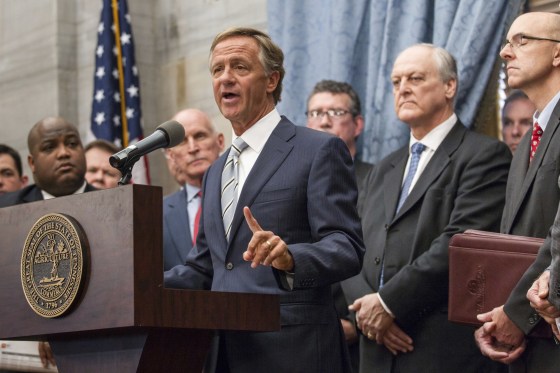Tennessee Gov. Bill Haslam signed a law on Friday that restricts the way words can be defined under state law.
The bill, known as House Bill 1111 or Senate Bill 1085, has caused controversy over its mandate to interpret words in the state code only by their "natural and ordinary" meanings. Conservative groups who lobbied for the law, like the Family Action Council of Tennessee, have said that it will help prevent same-sex spouses and LGBT parents from being treated the same as heterosexual families under the law.
"Undefined words shall be given their natural and ordinary meaning," the law reads, "without forced or subtle construction that would limit or extend the meaning of the language, except when a contrary intention is clearly manifest."
The bill itself uses vague language, but discussions in the legislature — as well as the history behind the law — show an intent to restrict LGBT rights.
According to a February YouTube video by the Family Action Council of Tennessee (FACT), the current law replaced a more controversial law the group helped submit in January.
Tennessee Senate Bill 30 explicitly mandated that "the words 'husband,' 'wife,' 'mother,' and 'father' be given their natural and ordinary meaning, without forced or subtle construction that would limit or extend the meaning of the language and that are based on the biological distinctions between men and women."
"It just says all undefined words in the code shall be given their normal and ordinary meaning. When we say husband, we mean a man. When we use the word father, we mean a man," said Fowler in the video. "And this is an attempt to tell the court, in cases like Knoxville and in future cases, when we use a word, we mean for it to mean what everybody thinks it means. And if that word makes the law unconstitutional, so be it."
That legislation stalled in committee after some controversy over what was perceived as its overtly anti-LGBT intentions. But the new law uses the same language without specifying family terms.
FACT president David Fowler, who served 12 years in the Tennessee Senate, says Senate Bill 1085 is "actually broader" than his earlier legislation.
FACT did not respond to an NBC News request for further comment.
Fowler referred to a Knoxville custody battle involving lesbian parents that grew into a conservative battlefield last year. FACT filed a motion to intervene in the case in order to block Erica Witt from being awarded partial custody of her ex-wife's child. A judge ruled against Witt, saying that because her ex-wife used artificial insemination and carried the baby, Witt had "no biological relationship with this child, has no contractual relationship with this child."
A number of other bills related to the Witt case have been proposed in Tennessee this year, such as Tennessee's House Bill 1406, which repeals a law that defines a child born through artificial insemination as "legitimate." That law would impact LGBTQ parents, single parents, and straight couples with fertility problems.
On April 27, after the Tennessee Senate passed S.B. 1085, one of its sponsors, Rep. Andrew Farmer, told NBC News the law "has nothing to do with same sex marriage or gender."
But after Haslam signed it into law Friday, conservative groups counted a victory.
"The bill is the Legislature's way of advising judges not to enact their policy preferences into our statutes by infusing well-known words with new, unintended meanings," said FACT in a Facebook post Friday.
Haslam issued a statement shortly after signing the law, saying that although he understands the concerns over the law's impact on marriage for same-sex couples, he doesn't believe it will be harmful.
"I do not believe the legislation accomplishes anything that isn’t already relied upon by the courts, even after the U.S. Supreme Court’s Obergefell decision in 2015," said Haslam. "And if a potential conflict did arise, the Tennessee Attorney General has opined that a court could resolve it through other statutory interpretation rules."
Haslam's statement appeared to contradict an earlier opinion written by the state's Republican Attorney General, Herbert Slatery, who wrote that S.B. 1085 could provoke a challenge to same-sex marriage.
For now, local LGBT advocates plan to watch and wait. Chris Sanders, spokesperson for the Tennessee Equality Project, told NBC News he wondered if laws like the one signed Friday are "an effort to get the marriage issue back before the courts" and slowly chip away at hard-won LGBT rights.
"We’re telling our members that if anyone is harmed by this law to let us know, so it can be challenged," said Sanders.
